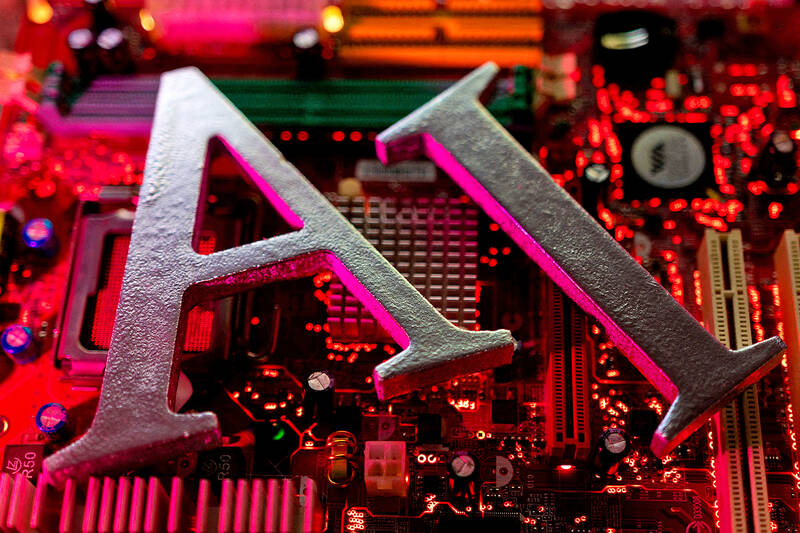Taiwan’s passive component industry is expected to grow 11.1 percent this year and increase another 6.3 percent next year in terms of production value, an Industrial Technology Research Institute analyst said on Tuesday.
The production value of the passive components industry is estimated to grow from NT$217.8 billion (US$6.80 billion) last year to NT$242 billion this year, Hsiao Jui-chung (蕭睿中), an analyst at the government-sponsored institute’s Industry, Science and Technology International Strategy Center said at a seminar on industrial trends in Taipei.
The main reason for the growth is the strong recovery of related industries, namely artificial intelligence (AI) servers and terminals. High demand for these products contributed to the industry’s positive growth in the third quarter, Hsiao said.

Photo: Reuters
The industry’s inventory reached a safe level in the second quarter, with capacity utilization rates for standard products and high-end niche products expected to increase 5 to 10 percent in the second half of the year, he said.
Export values have also grown year-on-year, with every month seeing higher numbers except for February, the month when the Lunar New Year holiday took place.
Market dependency and exports to China have fallen, due to the tech dispute between the US and China, as well as the trend for electric manufacturers to distribute manufacturing, Hsiao said.
Looking ahead, Hsiao predicted that the production value of the industry would grow 6.3 percent next year to NT$257.1 billion, driven by AI computers, smartphones and niche components for vehicle use.
Passive components for vehicle use made up about 17 percent of the industry’s revenue last year, with the proportion expected to rise to 20 percent this year, Hsiao said.
Worldwide demand for vehicle-use multi-layer ceramic capacitors (MLCC) could reach 450 billion units this year, and might increase to 500 billion next year, he said.
An AI laptop needs an average of 200 more MLCCs than a regular laptop, in order to adapt to the higher specifications in its processor and memory, Hsiao said.

With this year’s Semicon Taiwan trade show set to kick off on Wednesday, market attention has turned to the mass production of advanced packaging technologies and capacity expansion in Taiwan and the US. With traditional scaling reaching physical limits, heterogeneous integration and packaging technologies have emerged as key solutions. Surging demand for artificial intelligence (AI), high-performance computing (HPC) and high-bandwidth memory (HBM) chips has put technologies such as chip-on-wafer-on-substrate (CoWoS), integrated fan-out (InFO), system on integrated chips (SoIC), 3D IC and fan-out panel-level packaging (FOPLP) at the center of semiconductor innovation, making them a major focus at this year’s trade show, according

SEMICONDUCTOR SERVICES: A company executive said that Taiwanese firms must think about how to participate in global supply chains and lift their competitiveness Taiwan Semiconductor Manufacturing Co (TSMC, 台積電) yesterday said it expects to launch its first multifunctional service center in Pingtung County in the middle of 2027, in a bid to foster a resilient high-tech facility construction ecosystem. TSMC broached the idea of creating a center two or three years ago when it started building new manufacturing capacity in the US and Japan, the company said. The center, dubbed an “ecosystem park,” would assist local manufacturing facility construction partners to upgrade their capabilities and secure more deals from other global chipmakers such as Intel Corp, Micron Technology Inc and Infineon Technologies AG, TSMC said. It

DEBUT: The trade show is to feature 17 national pavilions, a new high for the event, including from Canada, Costa Rica, Lithuania, Sweden and Vietnam for the first time The Semicon Taiwan trade show, which opens on Wednesday, is expected to see a new high in the number of exhibitors and visitors from around the world, said its organizer, SEMI, which has described the annual event as the “Olympics of the semiconductor industry.” SEMI, which represents companies in the electronics manufacturing and design supply chain, and touts the annual exhibition as the most influential semiconductor trade show in the world, said more than 1,200 enterprises from 56 countries are to showcase their innovations across more than 4,100 booths, and that the event could attract 100,000 visitors. This year’s event features 17

EXPORT GROWTH: The AI boom has shortened chip cycles to just one year, putting pressure on chipmakers to accelerate development and expand packaging capacity Developing a localized supply chain for advanced packaging equipment is critical for keeping pace with customers’ increasingly shrinking time-to-market cycles for new artificial intelligence (AI) chips, Taiwan Semiconductor Manufacturing Co (TSMC, 台積電) said yesterday. Spurred on by the AI revolution, customers are accelerating product upgrades to nearly every year, compared with the two to three-year development cadence in the past, TSMC vice president of advanced packaging technology and service Jun He (何軍) said at a 3D IC Global Summit organized by SEMI in Taipei. These shortened cycles put heavy pressure on chipmakers, as the entire process — from chip design to mass